- Application deadline: January 16, 2026 at 16:00;
- Invitations to interviews: by January 20, 2026;
- Interviews: January 26, 2026;
- Competition results: January 28, 2026;
- Start of collaboration: February 1, 2026.
Details: Job offers
Details: Job offers


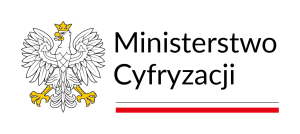
On October 21st, 2025, MS Valéry Trân Thiên of the Semantics and Computational Linguistics Team at ISS PAS represented the HIVE AI consortium at Masters and Robots Warsaw 2025. The event attracted experts, entrepreneurs, innovators, technologists, and leaders from renowned global academic institutions, associations, and technology blogs including Google, NYU Stern School of Business, Executive Coaching and Consulting Institute, Imperial Business School in London, Eindhoven AI Systems Institute, Copenhagen Business School, Queensland University of Technology, Human Future, and What’s Next? etc.
At the Ministry of Digital Affairs of Poland stand, Valéry Trân Thiên addressed visitor inquiries about the progress of artificial intelligence development within Poland. He discussed both commonalities and distinctions between prominent Polish generative models, Bielik and PLLuM. The majority of questions centered on the PLLuM model and its deployments in the municipal offices of Gdynia and Łódź.
Since 2024, the Semantics and Computational Linguistics Team of the Institute of Slavic Studies, PAS, has been actively involved in advancing artificial intelligence through participation in two major projects funded by the Ministry of Digital Affairs: PLLuM (“Responsible development of an open large language model PLLuM [Polish Large Language Universal Model] to support breakthrough technologies in the public and economic sectors, including an open-source Polish-language intelligent citizen assistant”) and HIVE AI (“HIVE AI: Development and pilot deployment of large language models in Polish public administration”). The team’s participation at prominent national and international events is a key component of wider efforts to promote the PLLuM family of Polish generative models.
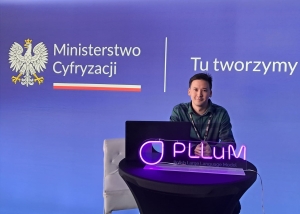
![]()


Dr. Csilla Horváth, visiting researcher from the University of Helsinki, spent a short-term scientific mission at the Institute of Slavic Studies PAS between 7–22 September 2025, within the framework of the Plurilingmedia Cost Action.
During her stay, Horváth participated in academic discussion on the role of digitalisation and media practitioners in maintaining the ethnolinguistic vitality of minority languages without official status and literacy with researchers cooperating in the project “Linguistic Diversity in Poland: Collateral Languages, Language-oriented Activities, and Conceptualization of Collective Identity”.
She also had the opportunity to attend the III Festiwal Gwar Pogranicza (III Festival of Border Language Varieties) in Hajnówka on 13 September 2025.
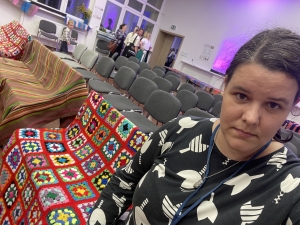
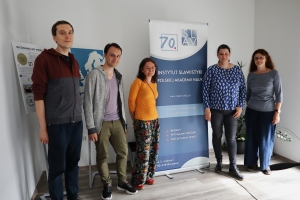
The 17th (Extraordinary) International Congress of Slavists took place in Paris from August 25 to 30, 2025. There were researchers from the Institute of Slavic Studies of the Polish Academy of Sciences (ISS PAS) among its participants.
On August 26, Prof. Dorota Krystyna Rembiszewska delivered a co-authored paper (with Janusz Siatkowski) entitled “Chronological Parameters in the Study of Lexis on the Polish–East Slavic Borderland”. On August 28, she represented Poland at the meeting of the national committees of the International Committee of Slavists (ICS). In addition, Prof. Rembiszewska assumed the chairmanship of the Commission on the Pan-Slavic Linguistic Atlas.
On Wednesday, August 27, at the request of the organizers, Prof. Ryszard Grzesik chaired the session entitled Rapports réciproques entre les cultures savantes slaves, byzantines et ouest-européennes jusqu’à l’époque modernę (Reciprocal Relations between erudite Slavic, Byzantine, and Western European Cultures until the Early Modern Period). Within this session, he presented a paper entitled “Hungarian Chroniclers on the Slavs”. The following day, he also chaired — in a hybrid format — a meeting of the Professor Gerard Labuda Commission on the Early History of the Slavs, which was accredited for the 2025–2029 term.
Prof. Piotr Sobotka delivered two lectures at the congress: on August 26, “Происхождение славянских экспонентов «истины» с функциональной точки зрения: заметки по этимологии и методу” (The Origin of Slavic Exponents of “Truth” from a Functional Perspective: Notes on Etymology and Method), and on August 30, “The Proto-Slavic Dictionary – Transition from the Printed to the Digital Version”. Furthermore, on August 28, during a meeting of the Etymological Commission, Prof. Sobotka was elected its secretary (with Prof. Marta Bjeletić from the Serbian Academy of Sciences as the chairperson). Among the newly elected Commission members there was also Dr. Szymon Pogwizd from the ISS PAS.
Prof. Alena Rudenka participated in Section 1.2. Histoire des langues slaves (History of the Slavic Languages), particularly in subsection 1.2.5. Interaction des langues slaves normées et des dialectes locaux à différentes périodes de l’histoire (Interaction of Standard Slavic Languages and Local Dialects in Different Historical Periods). Her paper focused on letters from the Grand Duchy of Lithuania from the 14th to 16th centuries. In addition to attending thematic sessions and round-table meetings, Prof. Rudenka also participated in the activities of the Commission for Slavic Ethnolinguistics at the Congress of Slavists, with which she has long been associated through her work on the EUROJOS project. The meeting was held in a hybrid format. A report on the Commission’s activities over the last six years has been published at: https://www.slavic-ethnolinguistics.org/home/novosti-events.
Dr. hab. Anna Engelking, Associate Professor at the ISS PAS, chaired Section 3.1.4. on August 29, titled L’héritage des grands slavistes (The Heritage of the Great Slavists), where she presented a paper entitled “The Unknown Face of Polish Slavic Anthropology: The Legacy of Józef Obrębski and Its Dissemination”.
On August 29, Dr. hab. Grażyna Szwat-Gyłybowa, Associate Professor at the ISS PAS,  presented a paper entitled “The Topos of the «Immured Woman» in the 20th and 21st Century Bulgarian Scholarly Thought”, in which she discussed, among other things, the results of her research conducted within the OPUS grant of the National Science Centre entitled “The Topos of the «Immured Woman» in the Cultures of Southeastern Europe and Hungary”.
presented a paper entitled “The Topos of the «Immured Woman» in the 20th and 21st Century Bulgarian Scholarly Thought”, in which she discussed, among other things, the results of her research conducted within the OPUS grant of the National Science Centre entitled “The Topos of the «Immured Woman» in the Cultures of Southeastern Europe and Hungary”.
Dr. hab. Zofia Sawaniewska-Mochowa, Associate Professor (prof. em.) at the ISS PAS, also participated in the congress. On August 28, during a session of the Commission for Slavic Ethnolinguistics, she presented a paper and a visual presentation entitled “Women’s Ego-documents as Sources for Ethnolinguistic Research”. The paper was closely connected to the Polish-Lithuanian team project currently being carried out 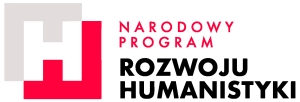 under the National Programme for the Development of the Humanities, entitled “The Ego-documents of Emilia Wróblewska (1850–1886) — A Testament of Life and Ideological Views of a Polish Woman from the Vilnius Intelligentsia. A Digital Edition of 7 Diaries with Critical Apparatus and an E-Monograph”. The lecture concerned methodological approaches to studying the complex mental construct of the identity of a woman living at the cultural crossroads during the time of partitions after the fall of national uprisings. The presentation sparked a lively and inspiring discussion. The session was attended by ethnolinguists from Poland, Croatia, Serbia, Bosnia and Herzegovina, North Macedonia, an independent researcher from Belarus, and Dr. Rima Cicėnienė, Director of Research at the Wróblewski Library of the Lithuanian Academy of Sciences, who represented the project partner from Lithuania..
under the National Programme for the Development of the Humanities, entitled “The Ego-documents of Emilia Wróblewska (1850–1886) — A Testament of Life and Ideological Views of a Polish Woman from the Vilnius Intelligentsia. A Digital Edition of 7 Diaries with Critical Apparatus and an E-Monograph”. The lecture concerned methodological approaches to studying the complex mental construct of the identity of a woman living at the cultural crossroads during the time of partitions after the fall of national uprisings. The presentation sparked a lively and inspiring discussion. The session was attended by ethnolinguists from Poland, Croatia, Serbia, Bosnia and Herzegovina, North Macedonia, an independent researcher from Belarus, and Dr. Rima Cicėnienė, Director of Research at the Wróblewski Library of the Lithuanian Academy of Sciences, who represented the project partner from Lithuania..
As part of the Congress, a meeting of the Commission on Linguistic Bibliography was held, chaired by Dr. Paweł Kowalski of the ISS PAS. During the session, new members were elected, including Dr. Roman Tymoshuk (ISS PAS), Dr. Jelena Janković (SANU), Dr. Ana Golubović (University of Belgrade), Dr. Julia Cygwinceva (NANU), Dr. Monika Łaszkiewicz (UMCS), and Dr. Ekaterina Petkova (BAS). Dr. Kowalski also participated in the thematic block of the Commission on Word-Formation and attended a meeting at the Serbian Embassy. Additionally, he is a candidate for the position of secretary of the Commission on the Pan-Slavic Linguistic Atlas.
This year, for the first time, the Slavic Studies Committee of the Polish Academy of Sciences, in cooperation with the publishing house of the Institute of Slavic Studies PAS, prepared the 14th volume in the series “From Polish Slavic Studies”, edited by Prof. Dorota Krystyna Rembiszewska, Prof. Ryszard Grzesik, and Prof. Stanisława Niebrzegowska-Bartmińska. As in previous years, the volume is divided into two parts: “Literary and Cultural Studies” and “Linguistics”. The volume includes papers by Polish historians, literary and cultural scholars, and linguists that were presented during the Paris congress.
Prof. Natalia Bernickaja, the chair of the ICS, announced that the next congress will take place in Prague in 2029.
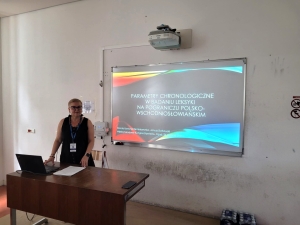
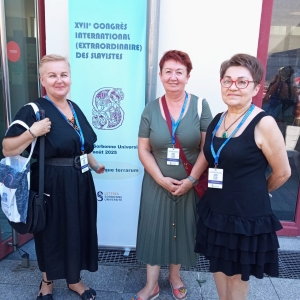
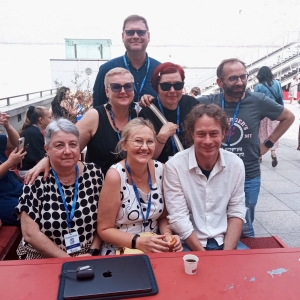
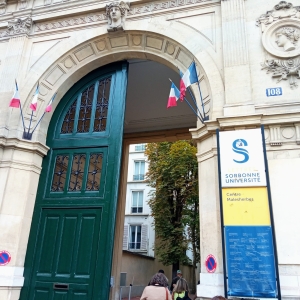
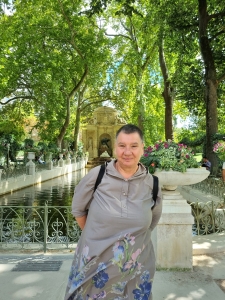
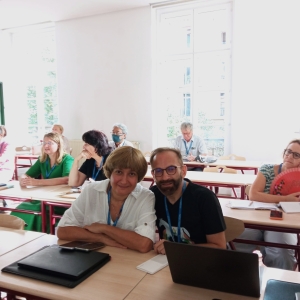
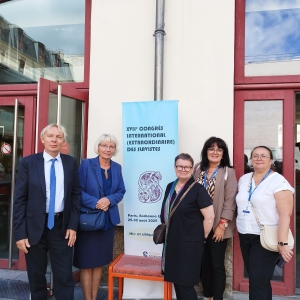
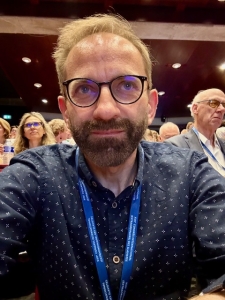
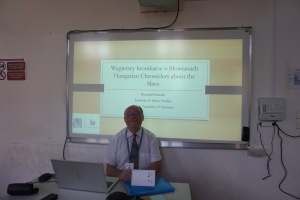
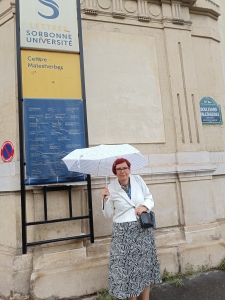
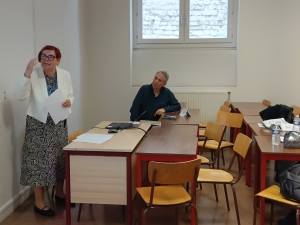
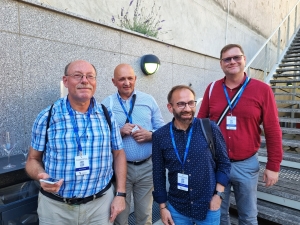
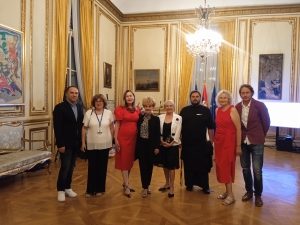
We invite submissions for issue 58 of the journal “Sprawy Narodowościowe. Seria nowa” (“Nationalities Affairs. New Series”), titled “Nation or Society? Strategies of Community Formation in Poland and Beyond”.
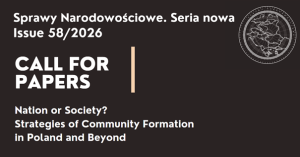 The 58th issue of our journal aims to explore the diverse strategies for building national and social community in Poland: from the period of Romanticism in early 19th century, through nationalist thought at the turn of the 19th and 20th centuries, to contemporary efforts to redefine social and national bonds.
The 58th issue of our journal aims to explore the diverse strategies for building national and social community in Poland: from the period of Romanticism in early 19th century, through nationalist thought at the turn of the 19th and 20th centuries, to contemporary efforts to redefine social and national bonds.
We welcome both theoretical reflections and analyses of case studies – from the 19th century to the present. We especially encourage submissions that explore nationand community-building strategies beyond the Polish context. Articles meeting the publication criteria will appear in the “Constellations” section.
Here is the full invitation along with the schedule of activities: https://journals.ispan.edu.pl/index.php/sn/en/announcement
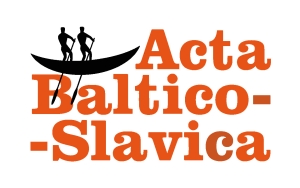 Topic: Signs of the Times, Changes in Space, Transformations of Identity
Topic: Signs of the Times, Changes in Space, Transformations of Identity
Editors of the volume: dr hab. Maksim Duszkin, prof. IS PAN and dr Kinga Geben
Call for Submissions
We invite submissions of scholarly papers to volume 50 of Acta Baltico-Slavica. The anniversary volume of our journal, entitled “Signs of the Times, Changes in Space, Transformations of Identity”, will be devoted to the processes of identity transformation, changes in space, and traces of time in the culture and languages of the countries of the Balto-Slavic region. We invite reflection on the interplay of time, space, identity and language, on how memories of the past influence the present, and how the heritage of the borderland is reinterpreted under the circumstances of globalisation, migration, and political tensions. We are interested in both historical aspects and contemporary phenomena related to collective memory and ethnic and linguistic identification. The volume is also open to submissions analysing linguistic minority narratives, cultural and linguistic landscape, and individual and collective identity in the linguistic space of the region.
The issues in focus include:
Apart from articles devoted to the issues in focus of this volume, we also invite submissions to our regular sections: “Sources and Materials”, “Discussions, Polemics, Review Articles”, “Reviews”, “Chronicle” and “New Publications”.
The deadline for submissions to volume 50 (to be made on the journal’s electronic platform) is 15 December 2025.
Please consider the following:
Please address any queries to: abs@ispan.edu.pl.

We would like to inform you about the results of the competition for the position of post-doc (2) in the project “Faces of Smuggling in the Polish-Slovak Borderland between 1918 and 1949” ref. no. 2023/51/D/HS3/01105 affiliated at the Institute of Slavic Studies of the Polish Academy of Sciences. After the evaluation of the submitted documents and the interview the competition committee decided to employ Dr. Dariusz Nikiel in this position.

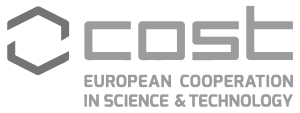
From 2 to 13 June 2025, the Institute of Slavic Studies of the Polish Academy of Sciences (Instytut Slawistyki PAN) welcomed Dr Lara Sorgo of the Institute of Ethnic Studies in Ljubljana as part of the PLURILINGMEDIA COST Action project. During her Short-Term Scientific Mission, Dr Sorgo had an excellent opportunity to learn about media in minority languages and their revitalisation, and to exchange ideas with fellow researchers.
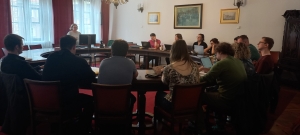
During her visit, Dr Sorgo gave a lecture to students of the Anthropos Doctoral School. In her lecture, titled “Between Policy and Practice: The Slovenian Model of Minority Protection”, she provided an overview of Slovenia’s minority protection model and presented empirical findings from research projects focusing on education, public administration and the media. Particular attention was paid to how radio, television, print, and digital media meet the needs of minority communities, with structured measures and practical challenges being highlighted.
ISS PAS organised a roundtable on minority language media. This scientific exchange provided a valuable opportunity to share ideas and obtain constructive feedback from experts in different research fields on MLM. Particular emphasis was placed on the role of minority language media in further developing and upgrading the theoretical framework of Dr Sorgo’s research.
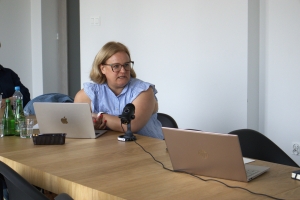
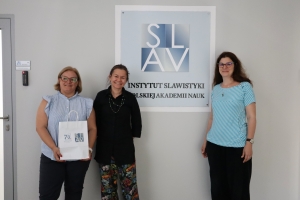
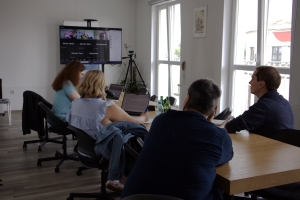
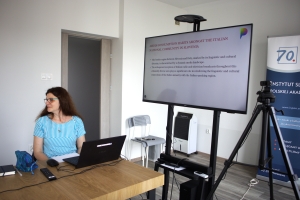
![]()
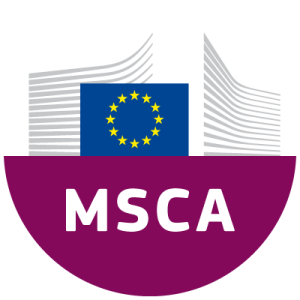
The Institute of Slavic Studies of the Polish Academy of Sciences (ISS PAS) invites expressions of interest from postdoctoral researchers who wish to apply for the prestigious Marie Skłodowska-Curie Postdoctoral Fellowships (MSCA PF, Horizon Europe) with ISS PAS as their host institution.
We are looking for talented and ambitious scholars from around the world who are eager to conduct cutting-edge research in a stimulating academic environment in the heart of Warsaw, Poland.
The Institute of Slavic Studies PAS is a leading research institution in Central and Eastern Europe with over 70 years of scholarly tradition. We conduct interdisciplinary studies on Slavic languages, cultures, histories, literatures, societies, and identities. We offer a dynamic and internationally engaged research community, access to extensive library and archival resources. We hold the prestigious HR Excellence in Research award, recognizing our commitment to providing a supportive and transparent research environment for researchers at all stages of their careers.
What We Offer
Who Can Apply
We are seeking excellent researchers of any nationality who:
Preferred topics
Timeline
How to Apply
Please send the following documents (in one PDF file) to horyzont@ispan.edu.pl with the subject: “MSCA PF – Expression of Interest – Your Name”:
For more information about our research profile, visit: https://ispan.waw.pl/default/en
For more information about MSCA PF, visit: https://marie-sklodowska-curie-actions.ec.europa.eu/actions/postdoctoral-fellowships
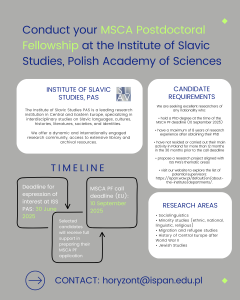
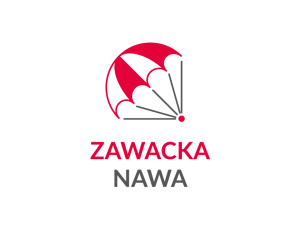
In connection with the announcement of the Zawacka NAWA – Arrivals Offer program, which aims to deepen international academic cooperation through individual arrivals to Poland of students, doctoral students, academic teachers and researchers, we cordially invite foreign researchers to carry out internships and study trips at the Institute of Slavic Studies of the Polish Academy of Sciences.
Detailed information on the Zawacka program is available on the NAWA website: https://nawa.gov.pl/en/international-cooperation-and-exchange/zawacka-nawa/incoming
Those interested in participating in the program submit applications to partner institutions in their countries according to their rules and deadlines. Researchers interested in implementing their project at the Institute of Slavic Studies PAS (host institution) are asked to contact us to determine a possible form of cooperation.
The Welcome Center at the Institute of Slavic Studies PAS offers assistance and mediation in such arrangements and provides detailed information about the program. Please contact Marcin Skupiński from the Welcome Center of IS PAN – welcome@ispan.edu.pl. Applications to ISS PAS will be accepted until August 31, 2025.
By continuing to use the site, you agree to the use of cookies, in accordance with the current browser settings. Privacy policy
The cookie settings on this website are set to "allow cookies" to give you the best browsing experience possible. If you continue to use this website without changing your cookie settings or you click "Accept" below then you are consenting to this.